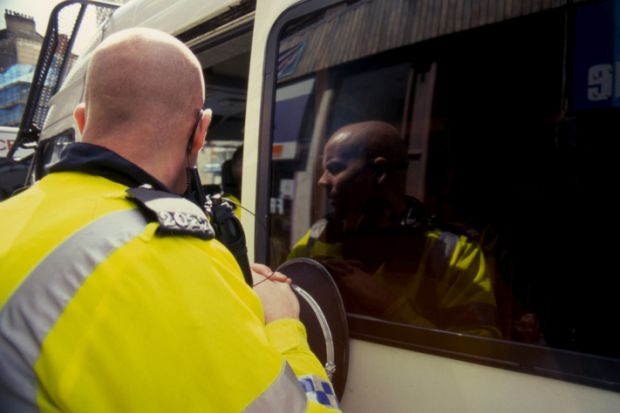Older lecturers are less likely to report students potentially at risk of radicalisation to Prevent, says a major new study revealing widespread “ambivalence” among scholars about the counter-terrorism scheme.
In the first major piece of quantative research into academics’ attitudes towards Prevent, researchers from King’s College London and Aarhus University in Denmark asked just over 1,000 university teachers how they would respond if one of their personal tutees – named “Adam” – expressed opposition towards an event being held on campus by the university’s LGBTQ+ society on the grounds that “the student union should not be promoting these abhorrent lifestyles”.
In the hypothetical situation, academics were told Adam had missed some classes and shown signs of “behavioural change”, according to the study, published by the British Educational Research Journal.
In various scenarios presented to scholars, Adam’s views became known because he told a friend (a “low-concern scenario”), handed out a leaflet criticising the event (deemed an “ambiguous scenario”) or took part in a protest that later became violent (“high concern”). “Anti-LGBTQ+ sentiment” was chosen for the basis of the study, it says, because it is “associated with a variety of extremist ideologies”.
According to the paper, titled “Understanding UK university academic staff attitudes towards recognising and responding to student radicalisation”, the most likely course of action by academics was to discuss the situation with an academic or professional services colleague, or to informally discuss with a safeguarding lead.
The next most common response would be to report the incident to a safeguarding lead formally – with roughly the same numbers of academics saying they would do nothing. Overall, most university teachers agreed with the statement that they would be “concerned by reporting [because] I may get an innocent student into trouble”.
University lecturers were unlikely to report their concerns directly to Prevent, the study also reveals. On average, academics were either “very unlikely” or “unlikely” to report the case to a Prevent team, ring the anti-terrorism or counter-extremism hotline or contact a government official about the incident.
Despite concerns that the Prevent duties introduced under the 2015 Counter Terrorism and Security Act would cause nervous academics to report behaviour to government officials that did not constitute radicalisation, there is “no evidence to indicate a tendency for over-reporting among academics teaching in British universities”, says the study, adding that there is “some evidence to suggest that there may be reticence to report radicalisation concerns even in situations where it could be considered appropriate to seek further advice”.
In February, a review of the scheme found referrals from higher education to Prevent were “strikingly low”, with only 24 referrals from higher education providers between August 2016 and July 2017, which the Office for Students said was typical for other years. Universities are “less likely to identify a radicalisation concern than a wider safeguarding issue”, the report stated, which is attributed in part to the “negative perceptions” of the scheme that are present in many institutions.
According to the latest study, academics with 11 or more years of teaching experience are least likely to take action either formally or informally over the imagined scenario, while those with three to 10 years of experience were also less likely to react than more junior academics, says the study.
It recommends “Prevent training could be enhanced by targeting more experienced academics”, but notes that “most [respondents] who had undertaken any training indicated that they had not found it particularly useful”.
Those in charge of Prevent duties at their institutions should also consider “tackling concerns about the tensions between the Prevent duty and freedom of speech policies and values” as those who indicated they strongly valued free speech are less likely to report potentially radicalised students, even in the “high-concern scenario” described in the study.
Register to continue
Why register?
- Registration is free and only takes a moment
- Once registered, you can read 3 articles a month
- Sign up for our newsletter
Subscribe
Or subscribe for unlimited access to:
- Unlimited access to news, views, insights & reviews
- Digital editions
- Digital access to THE’s university and college rankings analysis
Already registered or a current subscriber?








